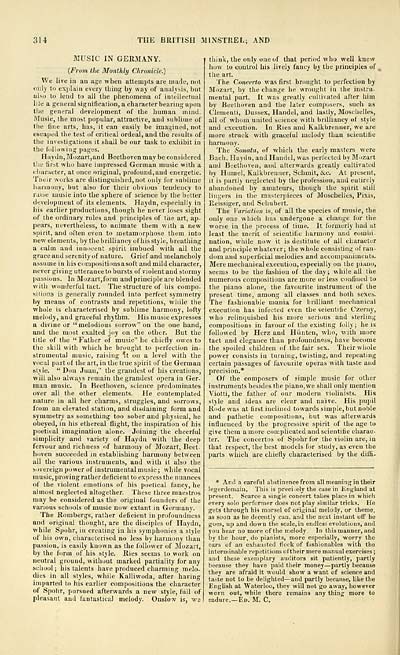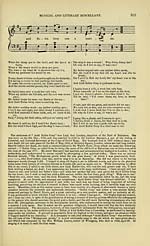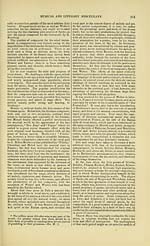Glen Collection of printed music > Printed music > British minstrel, and musical and literary miscellany
(652) Page 314
Download files
Complete book:
Individual page:
Thumbnail gallery: Grid view | List view

314
THE BRITISH MINSTREL; AND
MUSIC IN GERMANY.
{From the Monthly Chronicle.)
We live in an age when attempts arc maJe, not
only to explain every thing by way of analysis, but
ulsu to lend to all the phenomena of inteilectual
life a general signification, a character bearing upon
the general development of the human mind.
Music, the most popular, attractive, and sublime of
the fine arts, has, it can easily be imagined, not
escaped the test of critical ordeal, and the results of
the investigations it shall be our task to exhibit in
the f(»llo\ving pages.
Haydn, Mozart, and Beethovenmay be considered
the tirst who have impressed German music with a
cliaracter, at once original, profound, and energetic.
Tiicir works are distinguished, not only for sublime
Imrniony, but also for their obvious tendency to
raise music into the sphere of science by the better
developmeut of its elements. Haydn, especially in
his earlier productions, though he never loses sight
of the ordinary rules and principles of tiie art, ap-
pears, nevertheless, to animate them with a new
spirit, and often even to metamorphose them into
new elements, by the brilliancy of his style, breathing
a calm and innocent spirit imbued with all the
grace and serenity of nature. Grief and melancholy
assume in biscompositionsasoft and mild character,
never giving utterance to bursts of violent and stormy
passions. In Mozart, form and principle are blended
with wcmderful tact. The structure of bis compo-
sitions is generally rounded into perfect symmetry
by means of contrasts and repetitions, while the
whole is characterised by sublime harmony, lofty
melody, and graceful rhythm. His music expresses
a divine or " melodious sorrow" on the one hand,
and the most exalted joy on the other. But the
title of the " Father of music" he chiefly owes to
the skill with which he brought to perl'ection in-
strumental music, raising ?t on a level with the
vocal part of the art, in the true spirit of the German
style. " Don Juan," the grandest of his creations,
will also always remain the grandest opera in Ger-
man music. In Beethoven, science predominates
over all the other elements. He contemplated
nature in all her charms, struggles, and sorrows,
from an elevated station, and disdaining form and
symmetry as something too sober and physical, he
obeyed, in his ethereal flight, the inspiration of his
poetical imaginaticm alone. Joining the cheerful
simplicity and variety of Haydn with the deep
fervour and richness of harmony of Mozart, Beet-
h<iven succeeded in establishing harmony between
all the various instruments, and with it also the
sovereign power of instrumental music ; while vocal
nmsic, proving rather deficient to express the nuances
of the violent emotions of his poetical fancy, he
almost neglected altogether. These three maestros
may be considered as the original founders of the
various schools of music now extant in Germany.
The Rombergs, rather deficient in profoundness
and original thought, are the disciples of Haydn,
while Spohr, in creating in his symphonies a style
of his own, characterised no less by harmony than
passion, is easily known as the follower of Mozart,
by the form of his style. Ries seems to work on
neutral ground, without marked partiality for any
school; his talents have produced charming melo-
dies in all styles, while Kalliwoda, after having
imparted to his earlier compositions the character
of Spohr, pursued afterwards a new style, full of
pleasant and fantastical melody. Ouslow is, ive
think, the only one of that period who well knew
how to control his lively fancy by the principles of ^
the art.
The Concerto was first brought to perfection by
Mozart, by the change he wronght in the instru-
mental part. It was greatly cultivated after him
by Beethoven and the later composers, such as
Clementi, Dussex, Handel, and lastly, Moschelles,
all of whom united science with brilliancy of style
and execution. In Ries and Kalkbrenner, we are
more struck with graceful melody than scientific
hurniony.
The Sonata, of which the early masters were
Bach, Haydn, and Handel, was perfected by Mozart
and Beethoven, and afterwards greatly cultivated
by Humel, Kalkbrenner, Schmit, &c. At present,
it is partly neglected by the profession, and entirely
abandoned by amateurs, though the spirit still
lingers in the masterpieces of Moschelles, Pixis,
Reissiger, and Schubert.
The Variation is, of all the species of music, the
only one which has undergone a change for the
worse in the process of time. It formerly had at
least the merit of scientific harmony and combi-
nation, while now it is destitute of all character
and principle whatever; the whole consisting of ran-
dom and superficial melodies and accompaniments.
Mere mechanical execution, especially on the piano,
seems to be the fashion of the day; v^hile all tlie
numerous compositions are more or less confined to
the piano alone, the favourite instrument of the
present time, among all classes and both sexes.
The fashionable mania for brilliant mechanical
execution has infected even the scientific Czerny,
who relinquished his more serious and sterling
compositions in favour of the existing folly ; he is
followed by Herz and HUnten, who, with more
tact and elegance than profoundness, have become
the spoiled children of the fair sex. Their whole
power consists in turning, twisting, and repeating
certain passages of favourite operas with taste and
precision.*
Of the composers of simple music for other
instruments besides the piano, we shall only mention
Viotti, the father of our modern violinists. His
style and ideas are clear and naive. His pupil
Rode was at first inclined towards simple, but noble
and pathetic compositions, but was afterwards
influenced by the progressive spirit of the age to
give them a more complicated and scientific charac-
ter. The concertos of Spohr for the violin are, in
that respect, the best models for study, as even the
parts which are chiefly characterised by the dilli-
* And a careful abstinence from all meaning in their
legerdemain. This is precisely the case in England at
present. Scarce a single concert taltes place in which
every solo performer does not play similar tricks. He
gets through h'n morsel of orijjinal melody, or theme,
as soon as he decently can. and the next instant off he
goes, up and down the scale, in endless evolutions, and
you hear no more of the melody. In this manner, and
by tlie hour, do pianists, more especially, worry the
ears of an exliausted flock of fashionables with the
interminable repetitions of their mere manual exercises ;
and these exeniplai'y auditors sit patiently, partly
because they have paid tlieir money — partly because
they are afraid it would show a want of science and
taste not to be delighted — and partly because, like the
English at Waterloo, they will not go away, however
worn out, while there remains any thing more to
endure. — Ed. M. C.
THE BRITISH MINSTREL; AND
MUSIC IN GERMANY.
{From the Monthly Chronicle.)
We live in an age when attempts arc maJe, not
only to explain every thing by way of analysis, but
ulsu to lend to all the phenomena of inteilectual
life a general signification, a character bearing upon
the general development of the human mind.
Music, the most popular, attractive, and sublime of
the fine arts, has, it can easily be imagined, not
escaped the test of critical ordeal, and the results of
the investigations it shall be our task to exhibit in
the f(»llo\ving pages.
Haydn, Mozart, and Beethovenmay be considered
the tirst who have impressed German music with a
cliaracter, at once original, profound, and energetic.
Tiicir works are distinguished, not only for sublime
Imrniony, but also for their obvious tendency to
raise music into the sphere of science by the better
developmeut of its elements. Haydn, especially in
his earlier productions, though he never loses sight
of the ordinary rules and principles of tiie art, ap-
pears, nevertheless, to animate them with a new
spirit, and often even to metamorphose them into
new elements, by the brilliancy of his style, breathing
a calm and innocent spirit imbued with all the
grace and serenity of nature. Grief and melancholy
assume in biscompositionsasoft and mild character,
never giving utterance to bursts of violent and stormy
passions. In Mozart, form and principle are blended
with wcmderful tact. The structure of bis compo-
sitions is generally rounded into perfect symmetry
by means of contrasts and repetitions, while the
whole is characterised by sublime harmony, lofty
melody, and graceful rhythm. His music expresses
a divine or " melodious sorrow" on the one hand,
and the most exalted joy on the other. But the
title of the " Father of music" he chiefly owes to
the skill with which he brought to perl'ection in-
strumental music, raising ?t on a level with the
vocal part of the art, in the true spirit of the German
style. " Don Juan," the grandest of his creations,
will also always remain the grandest opera in Ger-
man music. In Beethoven, science predominates
over all the other elements. He contemplated
nature in all her charms, struggles, and sorrows,
from an elevated station, and disdaining form and
symmetry as something too sober and physical, he
obeyed, in his ethereal flight, the inspiration of his
poetical imaginaticm alone. Joining the cheerful
simplicity and variety of Haydn with the deep
fervour and richness of harmony of Mozart, Beet-
h<iven succeeded in establishing harmony between
all the various instruments, and with it also the
sovereign power of instrumental music ; while vocal
nmsic, proving rather deficient to express the nuances
of the violent emotions of his poetical fancy, he
almost neglected altogether. These three maestros
may be considered as the original founders of the
various schools of music now extant in Germany.
The Rombergs, rather deficient in profoundness
and original thought, are the disciples of Haydn,
while Spohr, in creating in his symphonies a style
of his own, characterised no less by harmony than
passion, is easily known as the follower of Mozart,
by the form of his style. Ries seems to work on
neutral ground, without marked partiality for any
school; his talents have produced charming melo-
dies in all styles, while Kalliwoda, after having
imparted to his earlier compositions the character
of Spohr, pursued afterwards a new style, full of
pleasant and fantastical melody. Ouslow is, ive
think, the only one of that period who well knew
how to control his lively fancy by the principles of ^
the art.
The Concerto was first brought to perfection by
Mozart, by the change he wronght in the instru-
mental part. It was greatly cultivated after him
by Beethoven and the later composers, such as
Clementi, Dussex, Handel, and lastly, Moschelles,
all of whom united science with brilliancy of style
and execution. In Ries and Kalkbrenner, we are
more struck with graceful melody than scientific
hurniony.
The Sonata, of which the early masters were
Bach, Haydn, and Handel, was perfected by Mozart
and Beethoven, and afterwards greatly cultivated
by Humel, Kalkbrenner, Schmit, &c. At present,
it is partly neglected by the profession, and entirely
abandoned by amateurs, though the spirit still
lingers in the masterpieces of Moschelles, Pixis,
Reissiger, and Schubert.
The Variation is, of all the species of music, the
only one which has undergone a change for the
worse in the process of time. It formerly had at
least the merit of scientific harmony and combi-
nation, while now it is destitute of all character
and principle whatever; the whole consisting of ran-
dom and superficial melodies and accompaniments.
Mere mechanical execution, especially on the piano,
seems to be the fashion of the day; v^hile all tlie
numerous compositions are more or less confined to
the piano alone, the favourite instrument of the
present time, among all classes and both sexes.
The fashionable mania for brilliant mechanical
execution has infected even the scientific Czerny,
who relinquished his more serious and sterling
compositions in favour of the existing folly ; he is
followed by Herz and HUnten, who, with more
tact and elegance than profoundness, have become
the spoiled children of the fair sex. Their whole
power consists in turning, twisting, and repeating
certain passages of favourite operas with taste and
precision.*
Of the composers of simple music for other
instruments besides the piano, we shall only mention
Viotti, the father of our modern violinists. His
style and ideas are clear and naive. His pupil
Rode was at first inclined towards simple, but noble
and pathetic compositions, but was afterwards
influenced by the progressive spirit of the age to
give them a more complicated and scientific charac-
ter. The concertos of Spohr for the violin are, in
that respect, the best models for study, as even the
parts which are chiefly characterised by the dilli-
* And a careful abstinence from all meaning in their
legerdemain. This is precisely the case in England at
present. Scarce a single concert taltes place in which
every solo performer does not play similar tricks. He
gets through h'n morsel of orijjinal melody, or theme,
as soon as he decently can. and the next instant off he
goes, up and down the scale, in endless evolutions, and
you hear no more of the melody. In this manner, and
by tlie hour, do pianists, more especially, worry the
ears of an exliausted flock of fashionables with the
interminable repetitions of their mere manual exercises ;
and these exeniplai'y auditors sit patiently, partly
because they have paid tlieir money — partly because
they are afraid it would show a want of science and
taste not to be delighted — and partly because, like the
English at Waterloo, they will not go away, however
worn out, while there remains any thing more to
endure. — Ed. M. C.
Set display mode to: Large image | Transcription
Images and transcriptions on this page, including medium image downloads, may be used under the Creative Commons Attribution 4.0 International Licence unless otherwise stated. ![]()
| Special collections of printed music > Glen Collection of printed music > Printed music > British minstrel, and musical and literary miscellany > (652) Page 314 |
|---|
| Permanent URL | https://digital.nls.uk/91442769 |
|---|
| Description | Scottish songs and music of the 18th and early 19th centuries, including music for the Highland bagpipe. These are selected items from the collection of John Glen (1833 to 1904). Also includes a few manuscripts, some treatises, and other books on the subject. |
|---|
| Description | The Glen Collection and the Inglis Collection represent mainly 18th and 19th century Scottish music, including Scottish songs. The collections of Berlioz and Verdi collected by bibliographer Cecil Hopkinson contain contemporary and later editions of the works of the two composers Berlioz and Verdi. |
|---|

